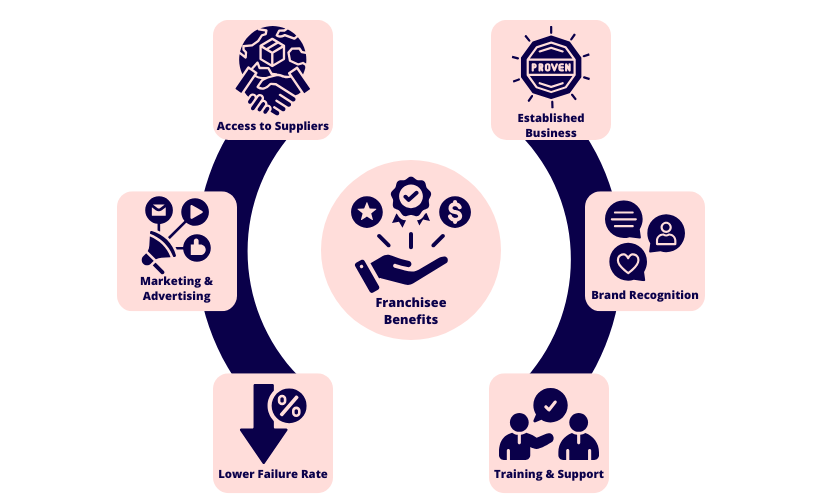Becoming a franchisee is a way to own a business without any of the teething issues of getting your idea off the ground. The built-in brand recognition and established operating systems make franchising a popular choice for aspiring small business owners.
If you think this could be the right fit for your long-term career goals, we’ll break down the structure, benefits, and obligations around franchising, as well as the advantages of joining an established franchise system.
What is a franchisee?
If you’re thinking about joining the ranks of potential franchisees, you’ll be either an individual or part of a group that purchases the rights to operate a business under an existing brand and franchise system.
Entering into franchise agreements with a franchisor means you’ll be able to tap into the brand’s established business model, intellectual property, resources, employees and more. It’s an arrangement that will see you – the franchisee – operate your business while benefiting from all the brand recognition and support that comes with the established name and reputation of the existing business.
As a franchisee, you’ll pay an initial franchise fee along with ongoing royalties or fees to the franchisor. In exchange, you’ll get to use the brand’s trademarks, operational processes, training and marketing support. Franchisees are expected to follow the franchisor’s guidelines to guarantee consistency and keep to the quality standards set out across all locations within the franchise network.
Examples of franchise businesses
- Food and beverage: Major fast-food brands and cafes that operate through franchising business models (and often with a global presence).
- Fitness and wellness: Gym and wellness franchises with a consistent brand experience.
- Retail and services: Companies that sell retail products or specific services for franchisees to grow corporate’s market reach.
What is a franchise agreement?
Depending on the company’s franchising laws, a franchise agreement will usually be a legally binding document that spells out the terms and conditions under which a franchisee is permitted to run the business. It covers areas like:
- Franchisee responsibilities: Your role in upholding the brand’s standards, managing day-to-day operations, adhering to the franchise system’s rules, etc.
- Franchisor obligations: What the franchisor will provide, such as training, support, intellectual property rights and other franchise opportunities.
- Franchise term: The length of time you are licensed to operate under the brand, with details on renewal terms and what needs to happen if you decide to put the business up for sale to other small business owners.
- Fees and royalties: Details on the initial franchise fee, ongoing royalties, other payments the franchisee pays, etc.
6 benefits of joining a particular franchise system

- Established business model: Unlike starting a new business from scratch, as a franchisee, you’ll benefit from a proven business model that means fewer risks that are saddled with new ventures. The franchisor’s systems and processes have usually been tested, refined and proven effective.
- Brand recognition: One top benefit for a potential franchisee is brand recognition. Compared to other business models, established franchises have an instant base of loyal customers who can drive traffic to the new franchise location from day one.
- Training and support: Franchisees will receive ongoing support from the franchisor, which could include anything from in-person training to direct access to a free online course. Whether it’s operational procedures or marketing strategies, it will arm franchisees with the tools needed to thrive.
- Lower failure rate: Many franchises have a lower failure rate than starting a new business. Established systems and brand reputation usually translate to a more secure business environment for the franchisee.
- Marketing and advertising: The majority of franchises handle national marketing efforts, which help bring visibility to all franchise locations. This collective effort benefits franchisees with large-scale advertising.
- Access to major suppliers: Franchisors might require you to buy materials and products from approved suppliers. While this limits your options, it can also mean big cost savings thanks to the franchise’s bulk buying power.
The franchise system and franchising code of conduct
Australia’s Franchising Code of Conduct is a mandatory industry code that governs franchising relationships, helping to protect franchisees by setting out clear standards around transparency, fairness, disclosure and more.
Under the Code, franchisors are required to provide a franchise disclosure document that includes important information about the franchise system and financial details, as well as any existing or past legal issues. Potential franchisees can use this disclosure document as part of their due diligence process.
There’s also the Franchise Disclosure Register, which holds information for many different franchise systems in Australia. This transparency can be helpful for franchisees who want to verify a franchise system’s health and reputation before making a huge financial commitment.
Responsibilities and costs of a franchisee
While franchises can deliver great returns for the right fit, they also come with big responsibilities. Franchisees must stick to the operating procedures and standards set by the franchisor – so you don’t have completely free rein. If you want total flexibility in your business decision-making, franchising might not be for you.
You’ll also need to factor in the financial obligations, which go beyond the initial franchise fee and can include:
- Royalties or management fees that are usually a percentage of the franchisee’s revenue (or a fixed amount).
- Marketing fees to support the brand’s national or regional advertising efforts.
- Operating costs that include everyday expenses related to running the franchise (e.g. staffing, rent, supplies).
What to think about before buying a franchise business
Becoming a franchisee can be a hugely rewarding pathway if you’re keen on operating a business with an established brand and strong support structure. But it’s not without its drawbacks. As a franchisee, you need to be prepared to follow set procedures and bear the financial obligations tied to the franchising model.
So, is becoming a franchisee for you? Weigh up the benefits and responsibilities carefully, do your due diligence and speak to business professionals who can help you better understand the franchise system.
If you’re a small business owner in Australia thinking about becoming a franchisee, know that it’s an accessible model that provides you with an opportunity to enter the market with the backing of a recognised brand and established systems. If you’re comfortable committing to the franchisor’s rules and have the time and funds to invest in making the franchise successful, you’re well on your way to becoming another successful franchisee.























